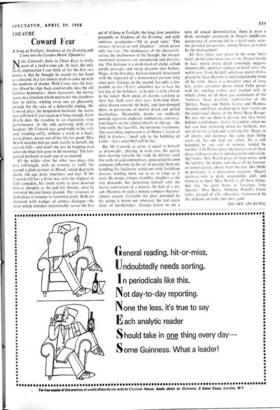THEATRE
Coward Fear
A Song at Twilight; Shadows of the Eveningtand Come into the Garden Maud. (Queen's.) Nob. Coward's Suite in Three Keys is really more of a twelve-tone job. At least, the only likely explanation I can think of for the first two pieces is that he thought he would try his hand at a discord, in a last minute dash to come up with the moderns of drama. With Come into the Gar- den Maud he slips back comfortably into the old familiar harmonies: three characters, the merest types, in a situation which makes not the sketchiest bow to reality, whiling away one act pleasantly enough for the sake of a delectable ending. Mr Coward plays the henpecked husband, the worm that will turn if you tread on it long enough. Irene Worth does the treading in an exquisitely irate performance. At the end, quivering with silent laughter, Mr Coward says good-night to his u ife and, treading softly, without a word or a back- ward glance, passes out of her life for good; Miss Worth watches him go, nods nastily to herself, the curtain falls—and won't she just be hopping mad when she finds him gone in the morning! The hen- pecked husband in each one of us cheered.
All the wilder after the other two plays (the first full-length, with an evening to itself,' the second a glum partner to Maud), which deal with death, old age, pain, loneliness and fear. If Mr Coward still has a brisk way with the slightest of light comedies, his touch seems to have deserted him as abruptly as the god left Antony, once he ventured beyond home ground. The structure of both plays is tenuous to vanishing point. Both are cluttered with wodges of aimless dialogue—the meal which stretches interminably across the first act of A Song at Twilight, the long, slow, pointless preamble to Shadows of the Evening; and with ominous prophecies—`All in good time,' 'The silences between us will lengthen,'—which prove only too true. The inadequacy of the characteri- sation. the shallowness of the thought, the meagre emotional resources are unexpected and distress- ing. The dialogue is a mish-mash of cliché, stilted purple passages and sharp descents into bathos. Hugo, in the first play, believes himself threatened with the exposure of a homosexual passion long since past: George, in the second, has only a few months to live (*Every schoolboy has to face the last day of the holidays,' as he puts it with a break in his voice). Both speak of chasms yawning at their feet, both avert their eyes, both find them- selves drawn towards the brink, and then dumped there, in paroxysms of mortal dread and pitiful inarticulacy. Meanwhile, drinks are endlessly poured, cigarettes endlessly stubbed out, conversa- tion lingers on the clinical details of old age—the false teeth, the face-lifts, the hormone treatments. The overriding impression is of Henry's vision of Hell in Embers---`small talk to the babbling of Lethe—that's what Hell will be like.'
But Mr Coward, as actor, is equal to himself as playwright : playing, in each case, the ageing hero moving towards the void, he delivers each line with an acid commentary, puncturing his own pompous inflations in the act of passing them on, handling his lacklustre witticisms with fastidious distaste, holding them out to us in tongs as it were. He weeps, cringes, trembles, shudders as the text demands, but permitting himself only the barest contraction of a muscle, the hint of a dry sob. Hysteria in such a minute compass becomes almost austere. Certainly the gloss provided by his acting is borne out wherever the text steers clear of incoherence: George leaves us on a
note of stoical determination, there is even a drab, unsought asceticism in Hugo's indifferent acceptance of growing old in a hotel suite, with- out personal possessions, among flowers provided by the management.
All three plays take place in the same Swiss hotel, on the same luxurious set (by Brian Currah) in fact, whose every detail cunningly suggests innumerable, identical replicas in hotel suites the world over. Even the deft, solicitous waiter (Felix. played by Sean Barrett) is indistinguishable from all his tribe. There is a dreadful sense of long. hot, airless corridors down which Felix passes with his tinkling trolley. past padded cells in which, alone, sit all those gay iconoclasts of the 'twenties, those prattling sophisticates of the 'thirties. Nicky and Helen, Garry and Monica, Amanda and Elyot, washed up in their 'sixties on the impersonal shores of the Hotel Beau Rivage. We may not see them in person, but they hover behind sealed doors: Garry Essendine, when we last saw him retreating down his bolthole, was not all set for a rich and satisfy ing life; Hugo, to all intents and purposes the same man thirty years on. has not had one either. He is still hounded by one sort of woman, tended by another. I.illi Palmer plays the mistress in all three plays, with great charm and discretion and ravish- ing frocks; Miss Worth plays all three wives, with the subtlety, the depths and above all the humour so conspicuously absent from the text. Her Hilde in particular is a miraculous creation—Hugo's secretary-wife is drab. dependable, dull, and German to boot. Miss Worth is all these things, but, like the great bores of literature, Jane Austen's Miss Bates. Anthony Powell's Uncle Giles. purged of vile substances, transmuted by the alchemy of irony into pure gold.
H !LARY SPU RUNG










































 Previous page
Previous page